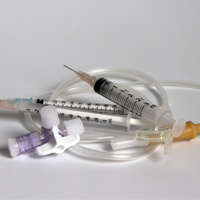The Disposable Medical Device Industry in India
Published by Sharekhan Education | May 19, 2023

By Amit Pathak | Sharekhan Education
Get ready to dive into the world of disposable medical devices! These remarkable apparatuses are designed for one-time or temporary use, making them essential in the field of healthcare. Just think about it: catheters, feeding tubes, gloves, surgical sponges, face masks, needles, syringes, and even implants like cardiac stents, drug-eluting stents, intraocular lenses, and orthopedic implants fall into this category. These devices aren’t just convenient; they also play a crucial role in reducing the risk of healthcare-associated infections. But creating the perfect disposable medical device requires a careful balance between cost, performance, reliability, materials, and shelf life.
Indian market for disposable medical devices:
Now let’s turn our attention to the Indian market for disposable medical devices. It’s a vibrant and diverse landscape, with a multitude of players. Most of them are low-tech manufacturers. Interestingly, around 60-65% of these players generate annual sales of less than Rs 100 million. In fact, nearly 90% of them have a turnover of less than Rs 500 million. This segment features traditional, tech-light products with low barriers to entry. Unorganized players cater to local clusters, while imports contribute to around 40% of the disposable medical device consumption in India. Domestic players can seize the chance to manufacture locally with insights into regulations, market dynamics, and quality standards.
Growth Prospects:
The growth of hospital and diagnostic infrastructure closely ties the demand for disposable medical devices in India. Urbanization and changing lifestyles drive demand for disposable medical devices for chronic diseases and elderly care. Increasing healthcare spending and awareness position India to become a major exporter of medical devices.The country boasts cost advantages, a skilled workforce, and impressive manufacturing capabilities, all of which position Indian companies to tap into global markets.
The Indian government is also actively supporting domestic players in the disposable medical device manufacturing sector. Various initiatives such as increased import duties, preferential treatment for Indian players in public procurement systems, allowing 100% FDI (Foreign Direct Investment), Production Linked Incentive schemes, and the withdrawal of exemptions on customs duties are provided by the government. Additionally, the government has introduced initiatives like Ayushman Bharat and the National Health Mission, which aim to enhance healthcare accessibility and affordability.
About Poly Medicine:
Now let’s shift our focus to a standout player in this field: Poly Medicine. This company stands among India’s largest exporters of disposable medical devices, a force to be reckoned with. An impressive 65% of its revenues come from exports, and it has earned a reputation as a preferred brand within Indian hospitals. Poly Medicine has been continuously expanding its product portfolio, going from offering 125 different products in 2017 to now offering over 160 diverse products. Looking ahead, the company is projected to deliver an impressive Revenue/EBITDA/PAT CAGR (Compound Annual Growth Rate) of 18%/23%/24% respectively over the period from FY22-25. (Fiscal Year 2022 to 2025 Estimated). By FY25E, its RoE (Return on Equity) and RoCE (Return on Capital Employed) are expected to reach 18.9% and 18% respectively.
Data Source: Broker Analyst Estimates
Investing in Knowledge:
If you’re intrigued by the concept of investing and want to learn more, we’ve got you covered! To know more visit our website www.sharekhaneducation.com
Disclaimer: Investment in securities market are subject to market risks, read all the related documents carefully before investing. For detailed disclaimer and registered office details visit link – https://www.sharekhan.com/disclaimer/Sharekhan_Education.html




